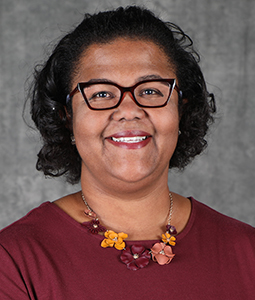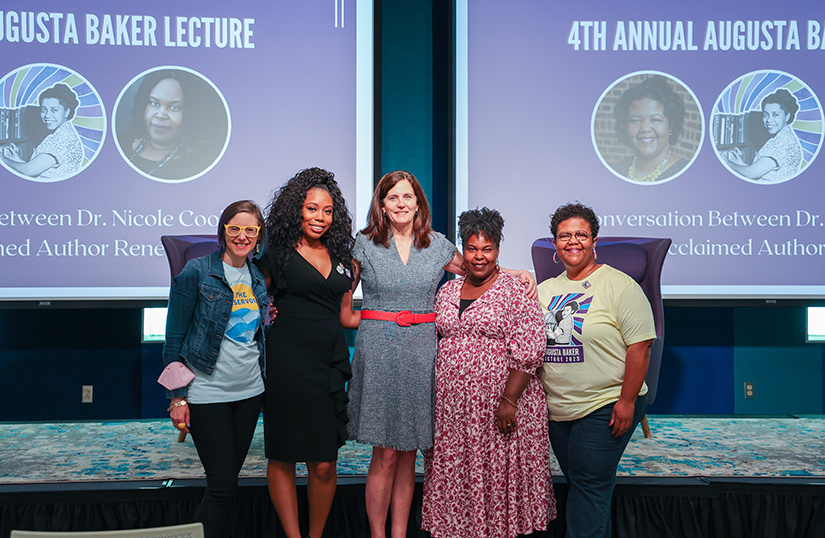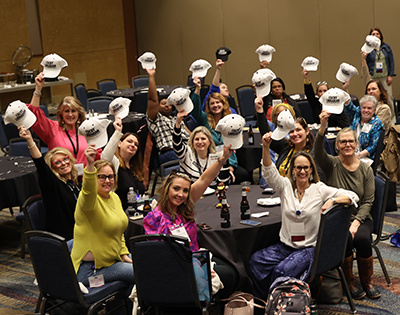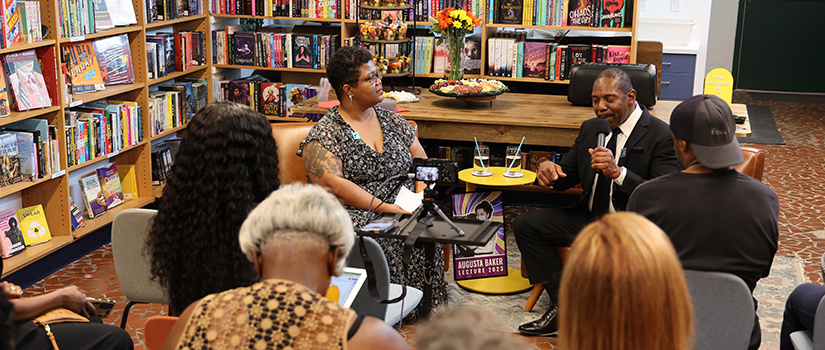Top photo: Augusta Baker Community Conversation with broadcaster Curtis Wilson

Remember walking into the library as a child and proudly presenting your library card to check out that perfect book or sitting in a musty university library cramming for an exam. Libraries serve as a community hub for many — a quiet place to think, research and rest. The person at the center of that hub, a librarian, serves as a human search engine, skilled at helping you find the precise bit of information you need. That search for knowledge, coupled with a passion for books, led Nicole Cooke to become a librarian more than 25 years ago.
“I served as a librarian for 13 years at a public library in New Jersey. To me, libraries represent access to information and democracy,” said Cooke. “Our libraries are one of the last safe spaces that are open to all people. They are the heart of the community.”
Yet early in her career, Cooke realized libraries, and more specifically librarians, did not always represent the diverse groups of people who made up their community.
“As a woman of color, I had very few colleagues that looked like me,” said Cooke. “I knew I wanted to change that so librarians may better reflect the people they served.”
Nationally, more than 85% of librarians are white, and most of those are women. Fueled by a passion to impact that statistic, Cooke decided to go back to college, earn a doctoral degree and become a professor. She now focuses her research and teaching, in large part, on diversifying librarianship and ensuring librarians are prepared to serve culturally diverse communities.
In 2019, Cooke joined the College of Information and Communications as the Augusta Baker Endowed Chair in Childhood Literacy and an associate professor in the School of Information Science.

“As a professor, I’ve had students who never had an educator of color. But South Carolina, where most of our graduates work after graduating, is filled with diverse communities,” said Cooke. “I would not be doing my job well if I did not prepare these students to best serve the communities where they will likely work. That means first educating them about diversity, equity, inclusion and social justice issues.”
Cooke said for some students, those lessons and conversations are uncomfortable, but often lead to more fulfilling relationships, careers and lives.
“We do critical self reflection,” said Cooke. “We talk about how we are positioned as human beings to work with populations very different from us. The internal work that takes place is the same whether a graduate decides to work in South Carolina or California. Librarians must get to know their communities. They cannot go in with a one size fits all lens, but instead they must get to know the specific needs of the people they serve.”
In addition to preparing future librarians, Cooke works to recruit and retain more people of color to the profession. But much like the teaching profession, librarianship faces a critical recruitment and retention problem. USC typically graduates more than 70 librarians each year, but that’s not enough to fill the job vacancies at South Carolina’s 180 public libraries and more than 1,200 school libraries.
“We continue to research and break down barriers that lead students of color, and all students, to avoid becoming librarians, as well as challenges that happen to librarians once they are in the workplace that lead them to leave the profession,” said Cooke.
Cooke said one major recruitment barrier is the cost of earning the Master of Library and Information Science degree.
“We launched the Baker Scholars program to recruit diverse students into the master's program. We match funding for students who already receive a $5,000 Spectrum scholarship from the American Library Association, for a total of $10,000 in scholarship dollars to the scholars.”
The School of Information Science also “hits the road,” according to Cooke, to recruit future students.

“We have a very active alumni base. Most librarians, at branches and schools across the state, are Gamecock alumni. Our faculty and staff visit their schools, career fairs and attend conferences to recruit students. A growing number of people working in libraries don’t have an MLIS degree yet, so we recruit them to continue their education, gain more skills and a higher degree.”
Cooke said their efforts to recruit underrepresented students are working, but growth remains slow. Since 2020, about 17% of USC MLIS graduates self-identified as students of color.
“We must continue the vital work — determine the gap between our discussions, what we are actually doing to recruit and our accomplishments.”
While working towards those recruitment goals, Cooke remains determined to prepare culturally competent and proficient librarians who find rewarding and long careers.
“I try to encourage all students to celebrate the differences in people and to learn more about the people they work with, as well as those they serve and live with in their communities. That is how we better recognize racism, stop microaggressions in the workplace and better serve our library patrons.”
Cooke knows firsthand that creating more inclusive, welcoming and safer working environments would positively impact retention for librarians, as well.
“I and many other colleagues of color experienced microaggression and racism by colleagues and patrons in the workplace. If you couple those negative experiences with pay that’s not as competitive as it should be and the rising stress of book bans and censorship attacks, librarians are choosing to leave the profession. We must work to change this narrative.”
Cooke’s multifaceted efforts to advocate and increase diversity in the profession and prepare culturally competent practitioners recently earned her the prestigious Joseph W. Lippincott Award. The recognition, presented by the American Library Association for distinguished service in librarianship, includes a $1,500 award and a citation of achievement.
“We do this work and sometimes wonder if we’re making an impact. It’s gratifying to have a tangible impression that your work matters. It’s validating. I am humble and grateful.”
